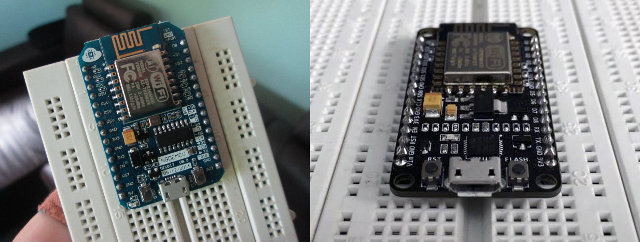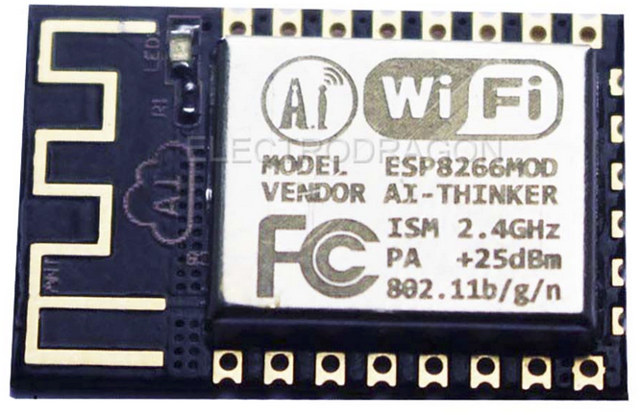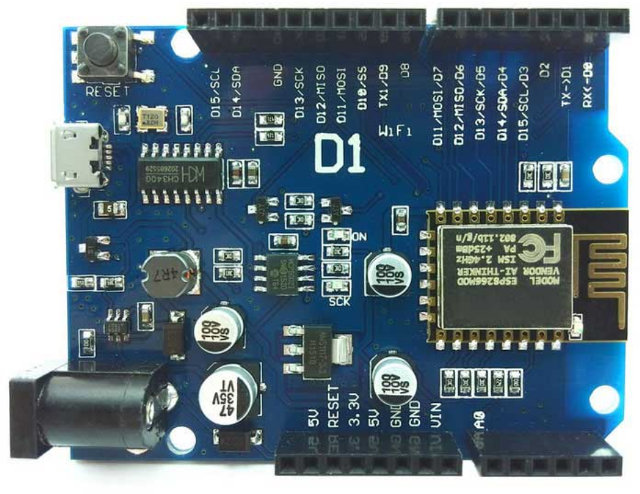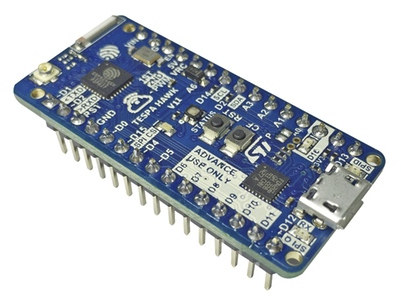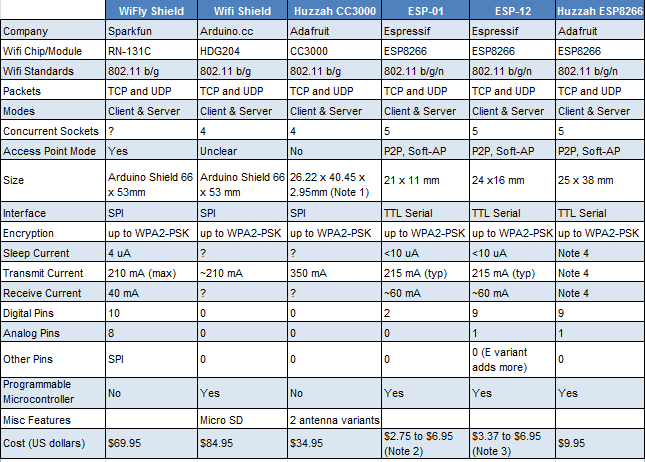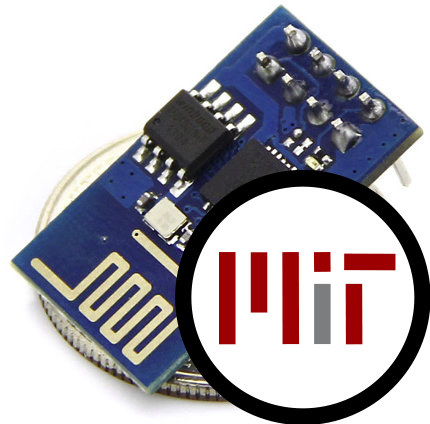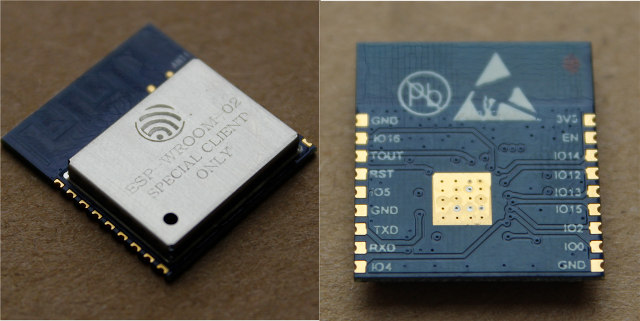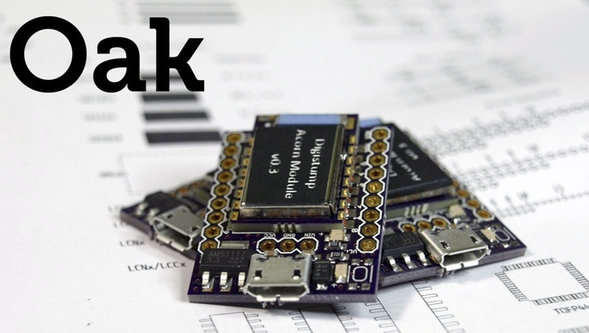Since ESP8266 is now so popular, I’ve recently bought a NodeMCU board to try it. I selected this board because the latest version of the board is breadboard-friendly, integrates a USB to serial chip, and it can be powered by a simple USB to micro USB cable. I also noticed a ESP8266 tutorial with NodeMCU firmware by SwitchDoc Labs the other day (using ESP-12 and Adafruit Huzzah), which I applied to my NodeMCU board, but since I encountered a few issues, I decided to report my findings, and write my own little getting started guide to switch on/off LED and GPIOs using a web interface. NodeMCU v0.9 and NodeMCU v1.0 If you are going to purchase a NodeMCU board it’s important to know there are two official versions: NodeMCU v0.9 with ESP-12 module NodeMCU v1.0 with ESP-12E module The main complain about NodeMCU v0.9 is that while it fits on […]
ESP-14 WiFi Module Combines ESP8266 with STM8S MCU
ESP8266 WiFi modules can be purchased for less than $3, while some STM8S 8-bit MCUs board sell for just above $1. A.I. Thinker decided to combine both by adding an STMicro STM8S003 micro-controller to ESP-12E module and called that ESP-14. ESP-14 specifications: WiSoC – Expressif ESP8266-EX WiSoC MCU – STMicro STM8S003F3P6 8-bit MCU @ 16 MHz with 1KB RAM, 8KB flash, and 128 bytes EEPROM Connectivity – 802.11 b/g/n WiFi I/Os – STM8: 15 GPIOs also supporting I2C, SPI, UART, and up to 5 10-bit ADC ESP8266: E_GPIO0 to select operating mode (running or download) Power Supply – 3.3V Power Consumption – System Standby mode 70 mA; 0.5 μA shutdown @3.3V Dimensions – 24 x 16 mm STM8S controls ESP8266 by AT commands, and all but one of the I/Os are directly connected to STM8S. I can see at least two advantages: 5 ADC inputs are available, and for battery […]
$9 ESP8266 D1 Board Features Arduino UNO Headers
We’ve already seen the Arduino IDE supports ESP8266(-EX) WiFi SoC, and some companies have designed Arduino shields for ESP8266 modules, but so far I had never seen an ESP8266 board with Arduino UNO form factor supporting Arduino shields, and that’s exactly what showed up in DX new arrivals RSS feed with a white label ESP-12E UNO board selling for $11.75 including shipping. The “D1” board has the following specifications: ESP8622 Module – AI-Thinker ESP12-E module (as found in NodeMCU) based on ESP8266-EX SoC @ 80 or 160 MHz with 4MB flash Connectivity – 802.11 b/g/n with PCB antenna. Supports station / softAP / SoftAP + station modes, WPA/WPA2 security. I/Os 11x Digital I/O pins 1x Analog Input pin I/O logic level: 3.3V ADC pin (A0) input voltage: 0-3.3V Debugging – Via micro USB using CH340G USB-TTL serial chip Misc – Reset button Power Supply – 6-24VDC via DC jack, 5V via […]
TESPA Hawk IoT Board Combines ESP8266 with STM32 MCU in an Arduino Nano Form Factor (Crowdfunding)
TESPA Hawk is an IoT board designed by three companies based in Thailand and Singapore: Deaware delivers the embedded software for the board, Gravitech handles hardware design and manufacturing, and MakerAsia provides the IoT cloud platform. At first glance, it looks like yet another board based on the popular ESP8266 WiSoC, but it also includes an STM32 micro-controller, and its pinout is the same as Arduino Nano. There are also various add-on boards (WINGs) to easily and quickly prototype IoT projects. TESPA Hawk specifications: WiSoC – Espressif ESP8266 @ 80MHz with 8MB Flash MCU – ST Micro STM32F042G6 ARM Cortex-M0 MCU @ 48MHz with 32KByte Flash, 6KB SRAM Connectivity – WiFI 802.11 b/g/n/ with on-board antenna and u.FL socket for external antenna USB – micro USB port for power and programming Expansion – 2x 16-pin headers (mostly) compatible Arduino Nano pinout including 5-channel full range 3.3V ADC (4x 12-bit, 1x 10-bit), […]
IoT Wi-Fi Modules Comparison Table – ESP8266 vs CC3000 vs RN131 vs HDG204
We now have several options to add WiFi to IoT / embedded projects at relatively low cost, and ESP8266 based solutions clearly wins on costs, but are there some advantages to other higher priced modules? To help us find out, Mike Barela has put up a comparison table with some Wi-FI modules based on Espressif ESP8266, Texas Instruments CC3000, Microchip RN131, and H&D Wireless HDG204 processors. Note 1 – Also comes in Arduino Shield size with SD card slot for $39.95 Note 2 & 3 – Adafruit and Sparkfun sell tested units with AT Firmware for $6.95. lower prices are available on eBay, but quality may vary. Note 4 – Currents are probably somewhat higher than stock ESP-12 due to onboard LED and regulator. The comparison is not exhaustive, but it still appears to show ESP8266 solutions support most features than pricer competing modules. There are however case where competing […]
ESP8266 SDK 1.1.0 is Now Released Under an MIT License
ESP8266 is the now famous dirt-cheap Wi-Fi SoC used for IoT applications. It can be used by hobbyists and companies alike. But for the later, there was a licensing issue as Espressif ESP8266 SDK was initially released under the GPLv3 license. GPL code is great and lots of open source projects are released under the most common open source license. But since proprietary, closed source software has still its place in the market place, some other more permissive licenses such as LGPL are used for library, and Android for example has an Apache License 2.0. So previously, if you developed an application using ESP8266 SDK, you’re code would have to be GPL too, since the license is viral. It would also cause issues if you had released your application under an Apache or MIT license. But now, all is well, as Espressif released ESP8266 SDK 1.10 under an MIT license, […]
Espressif WROOM WiFi ESP8266 Modules are FCC and CE Certified
Espressif, the company behind ESP8266 (EX) Wi-Fi chip for IoT applications, has now opened store on Taobao, where they sell WROOM-02 and WROOM-02 modules based on ESP8266EX with FCC, CE, TELEC, and SRRC certifications. WROOM-01 has some soldered headers that make it easier to use for hobbyists and prototyping, while WROOM-02 is more compact, and should be more suitable to include in your own products. But otherwise, they share about the same specifications: SoC – Espressif Systems ESP8266EX 32-bit RISC processor @ 80 MHz with integrated WiFi Wi-Fi – 802.11 b/g/n with STA/AP/STA+AP operation modes Header – 2x 18-pin headers with SDIO 2.0, GPIOs, SPI, UART, GND and 3.3V pins Dimensions – 11.5mm x 11.5mm Temperature Range – -40C ~ 125C Certifications – FCC, CE, TELEC, and SRRC The company can also provide “hardware reference design, antenna design, and SDK for secondary development”, but you’re likely to find most of […]
$10 Digistump Oak ESP8266EX Board is Arduino Compatible, Connects to the Cloud, and More (Crowdfunding)
A few years ago, I wondered why adding Wi-Fi to Arduino had to be rather expensive ($40+), and why there weren’t any low cost and small form factor Wi-Fi boards for embedded applications. But we’re now in 2015, embedded is “dead” giving rise to IoT, and I’m left wondering how it’s possible to make IoT Wi-Fi modules that cheap, and whether people will ever stop churning out cheap Wi-Fi boards, as I’m flooded with such news weekly… So when I saw yet another ESP8266 board on Kickstarter I was about to dismiss it, but since it was made by Digistump, that has an active community with their other products like DigiSpark Pro or DigiX, I decided to have a closer look. Digistump Oak hardware specifications: MCU – Espressif ESP8266EX 32-bit microprocessor @ 80MHz (overclockable up to 160MHz) with 1MB ROM (~300KB available for user code), 64KB RAM, 512 bytes EEPROM […]


